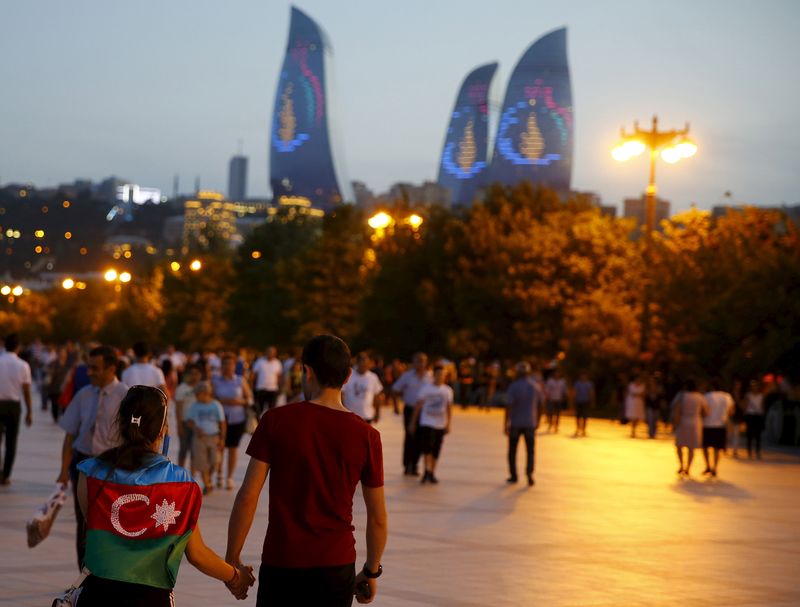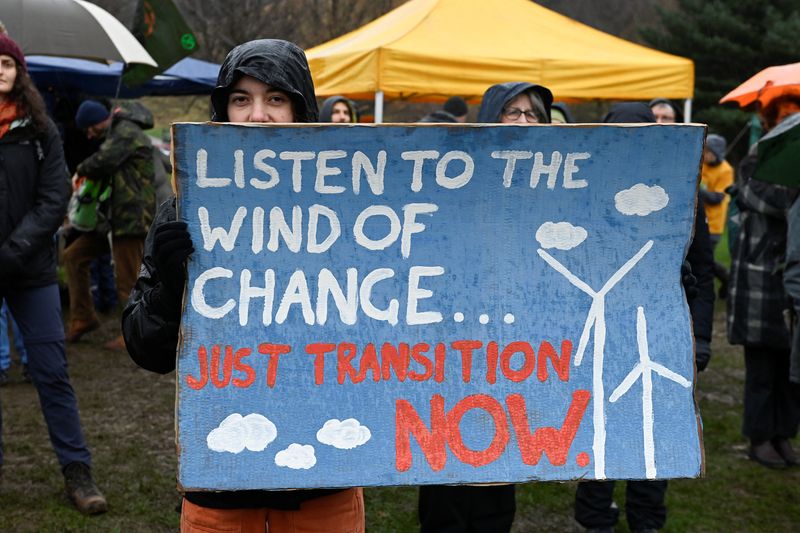By Kate Abnett and Valerie Volcovici
DUBAI (Reuters) -Azerbaijan is poised to host next year's COP29 climate change summit after winning backing from other Eastern European nations on Saturday.
The decision, which resolves months of geopolitical deadlock over where the next annual U.N. climate summit will be held, quickly drew focus to Azerbaijan's oil production and its human rights record.
With the rotating presidency of the summit shifting to Eastern Europe next year, nations from the region agreed during the ongoing COP28 summit in Dubai to back Baku's bid, the co-chairs of the group of countries said in a letter the U.N. climate change body on Saturday, seen by Reuters.
"We're very grateful to all countries, in particular to the Eastern European group and the [COP28 summit] host United Arab Emirates for their support," Azerbaijan's Ecology Minister Mukhtar Babayev said in an address from the main stage at COP28 on Saturday.
Zhala Bayramova, daughter of anti-corruption researcher Gubad Ibadoghlu, who was jailed in Azerbaijan after criticizing the country's oil and gas industry, told Reuters she was appalled at the decision.
"He is risking his life for this work," Bayramova said. "This work is quite meaningless when you have COP29 hosted in Azerbaijan."
A spokesperson for Azerbaijan's foreign ministry did not immediately respond to requests for comment about Ibadoghlu.
"Having COP29 gives legitimacy to the government," Bayramova added.
The decision on who would host COP29 had been held up after Russia vowed to veto any bid by a European Union country. The EU has imposed sanctions on Moscow over its invasion of Ukraine.
The bid by Azerbaijan, which is not an EU member, needs approval from the nearly 200 countries present at the COP28 talks. Delegates said they expected the vote to be a formality.
To win the bid, Azerbaijan reached an agreement with longtime adversary Armenia that assured it would not face the threat of an Armenian veto.
But Baku's relations with some Western countries have deteriorated since September, when Azerbaijan retook full control of the breakaway region of Nagorno-Karabakh, prompting an exodus of the territory's ethnic Armenian population.
Holding the presidency of a U.N. climate summit gives a country huge influence on its agenda and outcomes.
The COP28 summit in the UAE has been the biggest yet, with more than 90,000 delegates registered.
While the decision on who will host the event is usually made years in advance to allow countries time to prepare, Aykhan Hajizada, a spokesperson at Azerbaijan's ministry of foreign affairs, told Reuters on Friday that Baku was well equipped to handle the event.
When Azerbaijan's bid was first reported on Thursday, some raised concerns about holding the global climate talks in another oil producing nation. Azerbaijan is an oil and gas producer and a member of OPEC+.
Richard Black of the energy think tank Ember wrote on social media site X: "The road from #COP28 will, it seems, lead to Baku, possibly the world's first 'oil capital' a thousand years ago, where Marco Polo documented oil being traded, and where tourists can still top up their health by getting into a bath of crude."
Hajizada said he understood those concerns, and noted Azerbaijan's plans to diversify its energy sources to include more wind and solar power.
The European Commission last year signed a memorandum of understanding with Azerbaijan to double imports of Azeri natural gas as part of its strategy to diversify away from Russia.
LEGITIMACY TO THE GOVERNMENT
Ibadoghlu, a professor at the London School of Economics, was arrested on charges of dealing with counterfeit money and extremism when visiting family in Azerbaijan in July.
He had served from 2013-2019 as the civil society representative to the board of the Extractives Industry Transparency Initiative (EITI), an organization that advocates for open and accountable management of oil, gas and mineral resources.
The U.S. State Department and the Organization for Security and Cooperation in Europe earlier this year condemned Ibadoghlu's arrest and demanded his release. The EU in September adopted a joint motion to demand an investigation into the arrest.
"We can't let Azerbaijan use COP29 to distract from its abysmal record on freedom of speech and human rights," said Jason Bardwell, a spokesman for Publish What You Pay, the organization that created the EITI.

"As a major oil producer, Azerbaijan will need to listen to its critics," he said.
For daily comprehensive coverage on COP28 in your inbox, sign up for the Reuters Sustainable Switch newsletter here.
